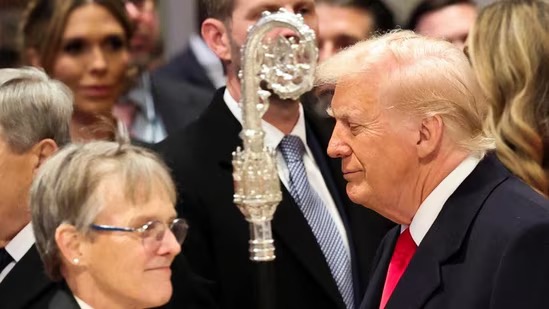The Bishop and the President

Dear friends,
Mariann Budde, the ninth Episcopal bishop of Washington, preached a sermon at the interfaith prayer service at the Washington National Cathedral on the day after the inauguration of President Trump. Her address, given during the week of Christian Unity, was critical of the president and his treatment of illegal immigrants. It has gained her fame or notoriety, depending on your point of view.
Many episcopal clergy were quick off the mark to praise her. “This is the Gospel!” said one. Another praised the bishop for her fearlessness and for “speaking truth to power.” Others felt that she had chosen the wrong time and place to voice her political views.
To church watchers, the sermon came as no surprise. In her utterances and in her writings, the bishop has evinced a long-standing antipathy toward Trump. Unafraid to enter the political arena, in 2020 she even asked for the President to be removed from office. Now fate had delivered him into her hands. As he and members of his administration took their places in the cathedral, could Budde resist poking the bear? Of course not.
I am probably in a minority of Episcopalians who didn’t like the sermon. The quiet, condescending tone, intended to sound caring and empathic, instead conveyed barely concealed disdain for her guests. The bishop weaponized religious language to skewer the President, knowing that he was helpless to fight back. In a final thrust, she invoked the name of God. The whole address was an unhappy mélange of ego and sanctimony, of animosity cloaked in piety.
I was surprised to hear the bishop say “Mr. President…gay, lesbian, and transgender children fear for their lives.” Why and where? If you make such a bold statement, it’s usually a good idea to give examples. The bishop didn’t elaborate. She emphasized honesty, but I began to question if she was being truly honest or simply fearmongering.
Subjective views are one thing, but there is also an objective principal to be considered. Is it acceptable for members of the clergy to use the pulpit to single out members of the congregation and humiliate them publicly? I speak as someone who has been given the awesome and sacred responsibility of being permitted to preach. How will my words uplift and edify? How will what I say inspire people to love God and neighbor?
The bishop preached about unity but her words created division within the church and outside of it. By the way, it is not “fearless” to use your power to reprove an individual within a congregation. Quite the opposite. The term “bully pulpit” has seldom been more accurately illustrated.
The bishop knew that Trump would feel uncomfortable. That was the point. It gained the bishop a new congregation of followers, who filled the cathedral the following week and gave her a standing ovation. As for Trump, I would not be surprised if he never went back to the Cathedral. I think that was also the bishop’s intention.
Expect more sermons like this in the coming days and weeks and months. It fits the mood of those who wish to elevate our political life to stand alongside our spiritual one. Whether this will be a good thing or a bad thing is open to debate. Personally, I believe there are some very good reasons for avoiding the politicizing of the gospel.
Here is one example. After watching Bishop Budde’s sermon, I turned to YouTube to see how this was done in the past. On January 22, 2013, the cathedral held the 57th Inaugural Prayer Service for President Barack Obama. People forget that, like Trump, Obama was a strong advocate for the removal of illegal immigrants. In the first Obama administration, 1.6 million were deported. (In his second term, the number was 1.5 million). At Obama’s second inauguration service, did the preacher single out the President and demand, “In the name of God, I ask you to have mercy on them?” No. Instead, he praised Obama obsequiously.
Political sermons are subject to partisan politics. This undermines their moral authority. This is the trap for all those who wish to bring politics into the pulpit. Are you willing to criticize both sides equally, or only the guys who play for the team you don’t like? And when I put myself in the pulpit, having an influential parishioner sitting in the pew beneath me, do I use my sermon to call him out as not Christian enough? No. That is not the place for such chastisement.
Following on from Bishop Budde’s sermon, I sense that the Episcopal Church is about to enter a time of political protest and activism. I believe this is a mistake. Look closely at Christ’s life and you will see the gospel is taking place not at the high level of politics but in small acts of human love and mercy. The future is not in a one party church, either right wing or left wing.
A couple of weeks ago we heard these words from St. Paul’s first letter to the Corinthians (12:12).
Just as the body is one and has many members, and all the members of the body, though many, are one body, so it is with Christ.
We are the members of Christ’s body. Through Christ we discover that unity which is God’s will. We are stronger when we love, weaker when we judge. Through diversity we can more effectively express the nature of Christ’s true presence in the world. That means celebrating our differences and learning to love better than we do now.
The world is looking to the Church for pastoral, not political, leadership and to be a sign of Christ’s presence. Do we seek to unite or to divide?
In Christ,
Father David


0 Comments
There are no comments.
Stay Tuned
Sign-up for David's newsletter